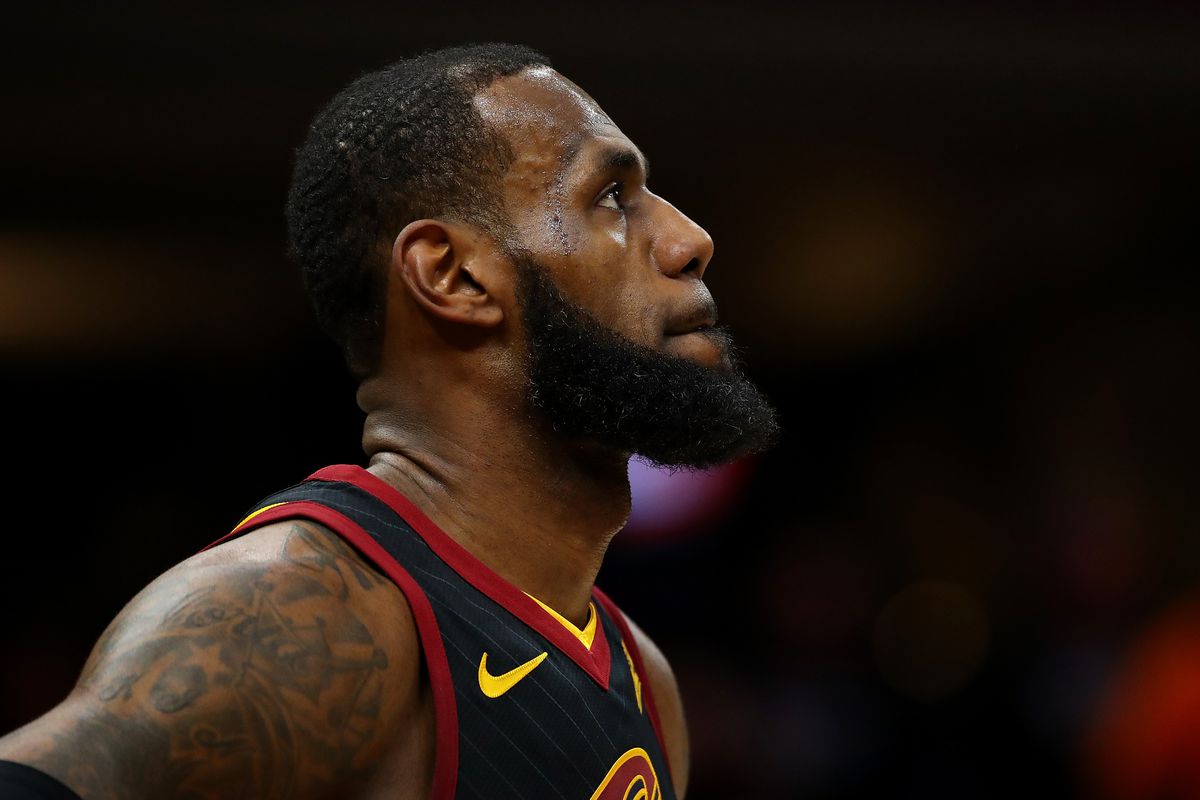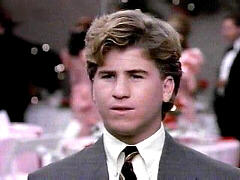
So let’s get this straight. Just 2 weeks ago, LeBron James was coming off a dominant playoff run, crushing the Bulls and the Celtics, and had established a clear roadmap to be the GOAT (win this year plus 3 or 4 more, win a few more MVPs, blah, blah, blah). Today, he has become the basketball equivalent of Michael Jackson, with the Internet becoming a breeding ground for at sorts of Lebron jokes.
“Did you hear that they’re celebrating National LeBron James Observance Day in Cleveland? Everyone gets to leave 12 minutes early.”
“Lebron is thinking of starting his own cell phone company. Rumor has it the roaming charges will be liberal but the phones will have no rings.”
“Why didn’t LeBron James go to college? He didn’t want to show up for finals.”
And my personal favorite…
“Did you hear Lebron is changing his nickname from ‘The King’ to ‘The LeBron Stopper’?”
Lebron’s has not only fallen out of the GOAT discussion, he all of a sudden finds himself mingling with the unseemly likes of Barkley and Malone. Is this really fair?
At first glimpse, the answer is no.
Taking a step back, I believe that this 2010-2011 Miami Heat season met or exceeded most folks’ preseason expectations. They won 58 games, finished with the 3rd best record in the NBA, put the Celtics to bed, and made it to the NBA Finals. In the process, Lebron established himself as the team’s alpha dog, had another MVP caliber season, and had a fantastically clutch playoffs leading up to the Finals. There is no doubt in my mind that he is a significant notch above players like Barkley and Malone (and even Nowitzki for that matter). Also, despite our love of ring counting, I’d put him ahead of Wade too (just don’t ask me to make that call in Game 4 of the Finals).
Which leads us to the fascinating question:
How can a player that is so brilliant in the regular season, has shown himself clutch time and time again (let’s please not turn this into a “Lebron is not clutch” argument), and has had equally amazing playoff performances, be so capable of turning in those Lebominations that we have seen over the past 2 years?
Let’s analyze…
First of all, this is not about whether Lebron is clutch or not clutch.
Before we begin the discussion, I want to reiterate, even as a Kobe fan, that I don’t really think Lebron’s perceived lack of “clutchness” has much to do with this. If anything, he has shown many times (even during the playoffs) that he is able to come through in some of the biggest moments. Are you really telling me that his victory in a pivotal Game 5 of the 2007 playoffs vs. the Pistons, or the 45/5/6 he put up against a much better Celtics team in Game 7 of 2008, was not pressure filled? Or that somehow his performance against this year’s Chicago Bulls team was a fluke? Or, as 82games.com validates, he has not been one of the top 4 clutch players in the NBA during the regular season each of the last 4 years?
In my book, Lebron has always been a generally clutch player, which is why I dismiss any argument here that begins with “he’s just not clutch…”. So this makes it all the more mysterious. If it wasn’t about clutchness, then what was the underlying psychology of Lebron James that caused him to perform so poorly?
The “Wayne Arnold” theory
Wayne Arnold was the elder brother of Kevin Arnold, the lead character of a late 80s/early 90s sitcom called “The Wonder Years”. Wayne’s character was built around bossing and bullying Kevin and his friends around, just for the simple reason that he knew he could. Deep down though, he was a fake. Wayne Arnold would back down quickly to kids bigger than him, and often to Kevin himself in the rare instances that he stood up for himself.
This is the most common theory regarding Lebron and his failures in the big moments. James has often been equated to Wayne Arnold, able to beat up on the weaklings in the playground (hello Wizards and Kings), while falling to those willing to stand up to him. We have seen this manifested by the great regular seasons that Lebron’s teams have had (when weak teams are weak, and good teams are going through the motions), only to shrink the first time another team hits him in the mouth. The facts are fairly straightforward here. In his career, Lebron has only won 1 playoff series where his team was behind (Detroit in 2007) and his performance in elimination games has been significantly worse than his overall playoff averages.
The “Dazed and Confused” theory
I know what you’re thinking – and no, I’m not implying that Lebron hits the Humboldt before Finals games (I’ll leave that for a pre-Kardashian Odom, Sheed, and Cliff “Spliffy” Robinson). Rather, this theory holds that Lebron isn’t sure of who he is supposed to be, and so when he doesn’t have clear direction, he tends to “drift” during games. In Cleveland, this rarely happened because Lebron was the clear alpha dog and his role was to be the team’s #1 primary option. However, in Miami, this became evident on a frequent basis. Pass or shoot? Force or Facilitate? Or most direct: Be Magic or Michael (or, as Steve Kerr suggested, Scottie)? These questions seemed to turn in Lebron’s mind often during the last few games of the Finals. He alternated plays where he seemed to never look at the basket while passing the ball, to jacking up ill-advised threes.
The corollary to this theory is that Lebron’s confusion is due to his lack of a “go to” move. Critics will point to Kobe and MJ – two players that refined their footwork and game at the elbow until they could count on these moves when they most needed it. Lebron has never established his move (unless doing a crab dribble followed by a layup, dunk or shooting foul can be considered a “move”). As a result, we saw when the Mavs defense effectively closed off the lane from Lebron (or more likely, he just chose not to force the issue), he had nowhere else to go.
A second corollary here is that Lebron needs to be fully in control of the ball in order to be truly effective. He has the inability to turn it “on and off” like Wade and Kobe, and therefore must work himself into a rhythm during the game.
From a psychological perspective, it is important for Lebron to spend some part of this offseason understanding what his 4th quarter role is on this team and how he can develop the skills to best play this role.
The Gloria James Theory
This has been well-documented by the likes of The NBA Realist here at Chasing 23, so I won’t belabor it here, but the general premise is that LeBron James has been victim to some disturbing events surrounding the women in his life: his girlfriend (allegedly sleeping with Rashard Lewis), and mother (allegedly sleeping with his former teammate and ex-felon, Delonte West), and while it is plausible that this happened once (last year), to happen twice seems far fetched (even with Gloria James’ illustrious history). And even if it did, Lebron needs to have the mental fortitude to move beyond it.
The Lack of Competitive Fire Theory
Another common and well-documented theory – Lebron simply does not have the will to win that MJ and Kobe before him had. I give a lot of credence to this one. How many times in the last few games did you see Lebron legitimately upset about the events that were transpiring? How many times did he pull a teammate aside and attempt to fire them up? It seemed like Lebron was sleepwalking for much of this past series as well as the series vs. the Celtics last year. At the end of the day, this side of Lebron is probably the least changeable, and may cost him dearest with respect to his legacy.
The Immaturity/Lack of Mental Stability Theory
Primary proponents of this theory include Dirk Nowitzki and Erik Spoelstra. This theory holds that (perhaps) from Lebron’s AAU days, he has not been required to develop the mental strength required to survive under the most pressurized situations. As a result, his coach needs to call him out prior to the 4th quarter of Game 6, saying that the team needed more “mental stability”. Signs of immaturity are everywhere for Lebron. From reports that he introduces himself to potential NBA players as “The King” to his coughing fit at Dirk Nowitzki’s expense (which of course, as always, was overblown by the media).
Most glaring of all, there is a lack of humility with Lebron. For most players, the script after the game should have read “I’m really upset that we lost. I’ll take ownership. I’m going to work my tail off during the offseason and come back to win this thing!” For Lebron, he took the opportunity to kick an America, that is already setting historical records for unemployment, while it was already down. Nice work, King.
My guess is, to some extent, all of these theories come into play when explaining the psychology behind what will most likely go down as the most disappointing performance in NBA Finals history.
Which theory do you subscribe to?



